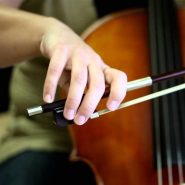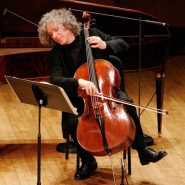Tag: Six Part Series
By Selma Gokcen March 11, 2013
Subjects Playing Healthy
Tags aiming for a goal, Alexander Technique, automatic, balancing the instrument, bow, breath flowing, cello, cello technique, cellobello, conceptions, evaluate, Experience, exploring our habits, framework for self-study, freedom, fundamental knowledge, Gokcen, inner composer, lasting value of Alexander Technique, left hand, movement, muscular tension, music, musical expression, nervous system, phrasing, physical pleasure of playing, place of silence, Preconceived ideas, pressure in the sound, psycho-physical, re-training of musicians, reactions, refining sensation and awareness, self-study, Selma, Six Part Series, subconscious patterns of learning, tension, thinking, Thinking in a new way, working with music
By Selma Gokcen February 25, 2013
Subjects Playing Healthy
Tags Alexander Technique, arms, beauty, bend and extend, body at ease, bow strokes, Casals, cello, cello playing muscles, cellobello, challenges, collapse, contraction, dynamics, energy, fingers, flexible, function, Gokcen, Habits, importance of quietness, increased resistance, inner pitch, misguided effort and unease, nasal sound, neck, partnership, perspective, powerful accents, powerful arms, pressured sound, principle of opposition, process, pull and push, repeated sensory stimulation, Selma, sensitive gesture, sensory awareness, simple gesture, Six Part Series, teaching table, thinking in new ways, unwanted sound, volume, wrist
By Selma Gokcen February 18, 2013
Subjects Playing Healthy
Tags Alexander Technique, associations, balance, bowing, calm breathing, cello, cellobello, contraction, engage in conversation, exploration, Gokcen, Habits, head-neck-back relationship, ischial tuberosities, natural, natural movement, negative associations, one-sided instrument, opposition, pelvic rocker bones, positive associations, posture, power, practicing, quiet practice, receive the cello, relationships, rotation of the spine, Selma, shifting weight, simple activities, sitting, Six Part Series, Spine, tension, tension in shoulders and back, thinking in new ways, torso, understanding, value
By Selma Gokcen February 11, 2013
Subjects Playing Healthy
Tags ability, Alexander Technique, attention to detail, bow arm, cellists, cello, cellobello, creating balance, cultivate awareness, energy flowing through the body, Gokcen, Habits, instrumentalists, Listening, music, musicians, opposition, Part II, powerful force of energy, proper weight transfer, quietness, relationship of the head back and spine, Selma, sharpening the senses, Six Part Series, tension in the neck, the back, Thinking in a new way, top level performing, trying, well-coordinated body, willing




